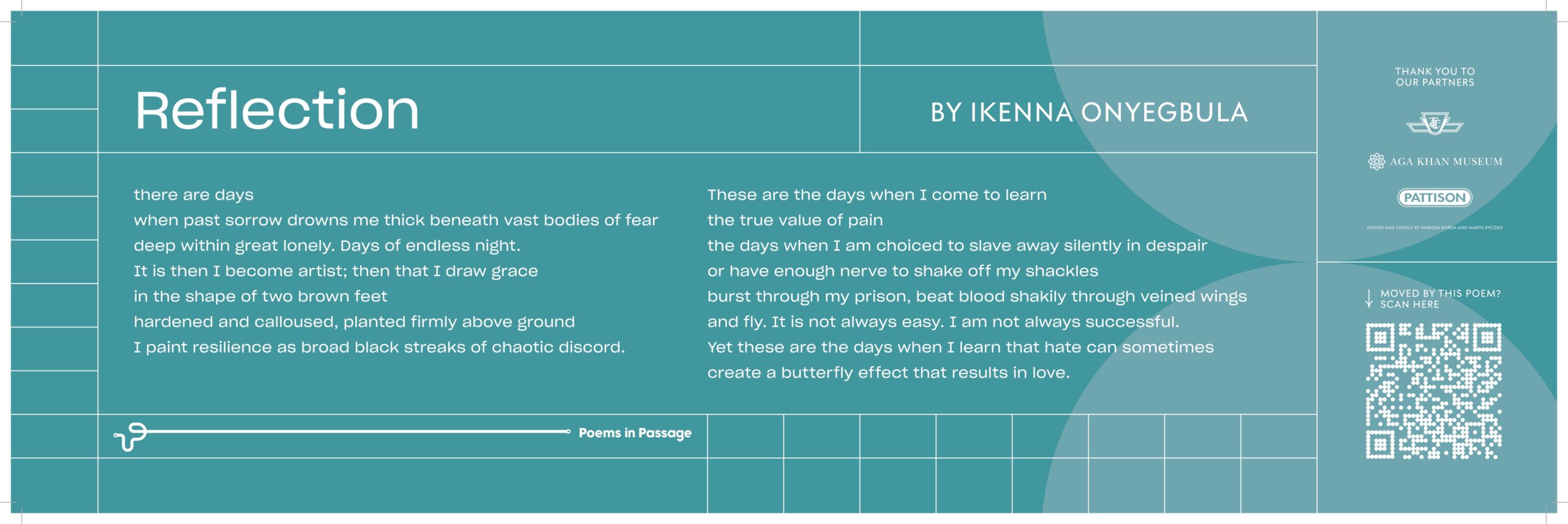Take a step back on your commute with TTC’s newest poetry program “Poems in Passage”, bringing lyrical pieces of literature to your morning rush. This new initiative will present work by diverse emerging and established poets on 75% of TTC buses and trains.
After a similar project called “Poetry on the Way” mysteriously dissolved in 2012 after running for 12 years, childhood best friends Latif Murji and Addesse Haile decided to revitalize the universally-loved public art initiative. After wondering what happened to the program they admired, the duo decided to kickstart a passion project.
“The idea of Poems in Passage was born out of nostalgia and a deep-seated belief in the power of words,” says Haile. “We wanted to resurrect a cherished memory from our youth, turning it into a conduit for creativity and representation for our city.”
The selection process for poems celebrates diversity by including traditionally underrepresented and equity-seeking groups. The first series of poems includes works from a range of writers, but they seek to spotlight translated poetry in an array of languages and dialects in future series. The poems that launched this month are as follows:
- Growing Old(er) by Lillian Allen
- Love Speak by d’bi.young anitafrika
- ALT-Spring by Britta B.
- Song of Sheba by Adebe DeRango-Adem
- Seed Cycle by Martin Gomes
- I text my love at Old Mill Station by Andrea Josic
- afkaaga by Furqan Mohamed
- I Am Both by Latif Murji, who also co-founded the program
- Reflection by Ikenna Onyegbula
- Footnotes for the Toronto Sky by Pujita Verma
- To all of the Lights by Najwa Zebian

Courtesy of Poems in Passage
Poems in Passage gives poets and local creatives the opportunity to have their creativity recognized. As the TTC remains the main mode of transportation across the city for millions of riders daily, these installations provide an invaluable platform for those stepping into the art scene. Socially informed artistic expression is necessary, and this open call serves all commuters.
Prior to the launch, the duo held an open call for print submissions and poetry slams in collaboration with Toronto Poetry Slam. They received stories from various communities and backgrounds, allowing them to elevate a range of dynamic voices.
“This project is special because in our inaugural year we have managed to be inclusive of both written and spoken forms of poetry,” says Poet-in-Residence, Britta Badour. “I am impressed with how much room for possibility and potential that exists within Poems in Passage. There’s more than one way to have your voice (and poetry) recognized.”
Najwa Zebian, an acclaimed Canadian advocate and author included in Poems in Passage shares that commuters may feel unheard in transit spaces. “They walk around feeling like they don’t matter or feeling invisible, and then they see a poem or piece of art that reminds them they do matter. I believe these works are part of the glue that brings us all together, uniting us.”
As commuters bypass these barriers, she hopes that the familiarity of human pain will bring them closer together.
“Though our words may differ in the way we string them together, we all share an underlying cry to be heard and seen for who we are,” says Zebian. “In a way, our soft voices come together to create one loud scream that is unavoidable. It demands to be heard and seen.”



 Follow Us On Instagram
Follow Us On Instagram
